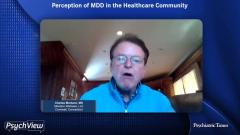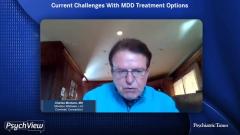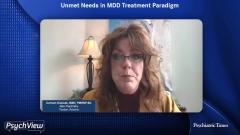
Perception of MDD in the Healthcare Community
Experts in psychiatry share their thoughts on the perception of MDD within the healthcare community and the implications of this condition being viewed as chronic vs episodic.
Episodes in this series

Gus Alva, MD, DFAPA: You touch base on the perspective of chronic vs episodic and I’m particularly intrigued by this situation. I’d like you to comment on the perception that you feel is current among the health care community regarding major depressive disorder (MDD), and…this is specifically the area that I want you to consider: What are the clinical and practical implications of MDD being viewed as either chronic vs episodic. I’m being a bit of a devil’s advocate with this because I think that we’re right at the cusp of seeing a paradigm shift in our view of MDD, considering different agents that we’ve been investigating recently. This is important because we know that many patients are undertreated and continue to suffer. Who wants to take the first crack at that one?
Charles Montano, MD: I will. I love the question and I think that we are about to have a paradigm shift, hopefully. There is a problem in medical education, in particular, in primary care, where most of the depressed patients present. There isn't enough emphasis on educating primary care doctors about depression; the full and huge impact that it has with absenteeism, presenteeism, suicide, families breaking up, and children being abused. We have 37 antidepressants last I counted in the United States. Most primary care doctors know how to prescribe 1, 2, or 3 at the most. And unfortunately, it’s only one little way of approaching depression. Although it has impact, it doesn’t have enough, [seeing] we are not engaging and using all the resources. And that’s not just antidepressants, it goes beyond; it goes to transcranial magnetic stimulation, electroshock therapy, deep brain stimulation, and all kinds of other modalities that are still available. We need to put the fire out and we’re not putting it out. If the chronic [disease] persists and gets worse, the depression persists and gets worse, and people do not thrive, it’s like having no fertilizer for the garden. The brain cells die. It’s just not a good thing. If it’s episodic, it’s still horrible. We haven’t even talked about the relationship between bipolar and unipolar depression and mixed depressions, and we haven’t talked about attention-deficit disorder, hyperactivity disorder, and that interplay and the antidepressants you’d need with the comorbidities. You need to think about the comorbidities. You need to think about making sure you’re working with what you’re working with, with unipolar [depression]. So there needs to be a lot more education, bottom line. That’s why these kinds of programs are so valuable.
Gus Alva, MD, DFAPA: Anxiety disorders also.
Charles Montano, MD: Yes, and anxiety disorders. That’s right.
Gus Alva, MD, DFAPA: Absolutely. Your thoughts with this, Carmen, the chronic vs the episodic perspective of MDD? How do you feel it’s viewed predominantly by our colleagues right now?
Carmen Kosicek, MSN, PMHNP-BC: I think that many see it as chronic with waves of episodic throughout. That’s what I think the reason is that I tend to see the referrals to me in psychiatry, or even when I was working in women’s health: that once someone is put on an SSRI [selective serotonin reuptake inhibitor], it appears that they’re on it for life. I don’t see that it was dosed, get them up to where they’re feeling better, hold onto that for a little bit, and off. Once I have seen SSRIs on board, it’s for decades. Is that what you’re seeing?
Gus Alva, MD, DFAPA: It’s interesting. If we’re dealing with a primary episode, the seminal episode where the individual has never experienced MDD, it’s not an uncommon thing to take into consideration that 50% of individuals may not have a recurrence. We know that 50% well, and unfortunately with each episode, that…increases the likelihood of that occurring. You’re right; based on just the specifics of where we’re at, we end up seeing a lot of people that have already been cycled through the primary care setting on multiple occasions. Having said that, though, this is really an interesting point.
TRANSCRIPT EDITED FOR CLARITY
Newsletter
Receive trusted psychiatric news, expert analysis, and clinical insights — subscribe today to support your practice and your patients.

















